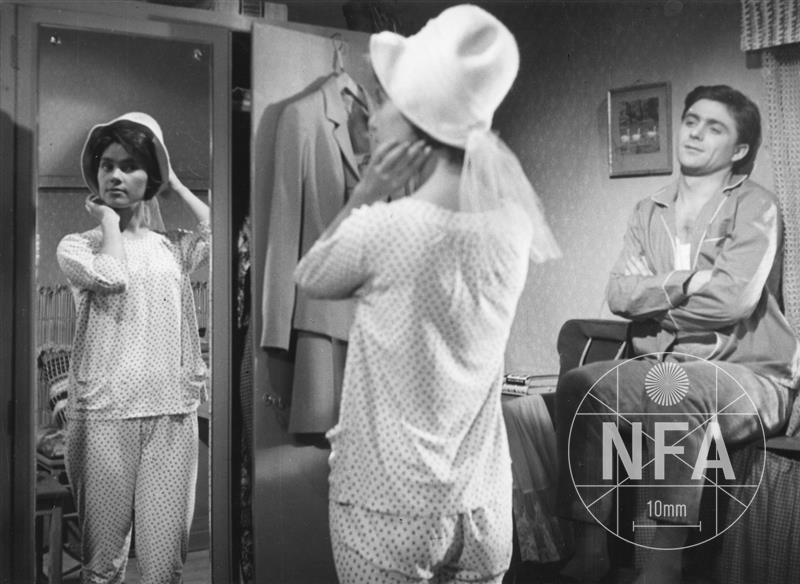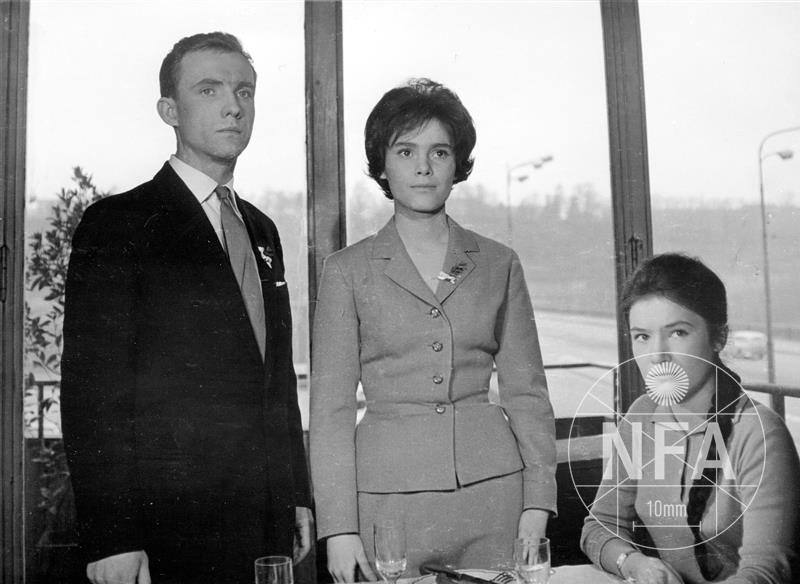The Black Dynasty
Country
CzechoslovakiaCopyright
1962Production year
1961—1962Premiere
30 November 1962Runtime
89 minDirector
Štěpán SkalskýCategory
filmGenre
dramaTypology
featuretheatrical distributionlongOriginal title
Černá dynastieCzech title
Černá dynastieEnglish title
The Black DynastySynopsis
The three generations of the Koudelka family work in a factory producing locomotives. They live together in a small house, and although they love each other, there is never a lack of quarrels in the family. The granddad Anton used to be an enthusiastic pioneer of the Czech locomotives as early as under the Emperor of Austria. Today, he watches every bit of slapdash workmanship in the workshops with displeasure. He brought up his son Rudolf alone, as his wife Klárka died before his return from the First World War. There was a great quarrel between the father and the son during a strike in which Rudolf took part despite his father's disapproval. Anton was then punished, too, on behalf of Rudolf, and therefore threw his son and daughter-in-law out of the house. The father and son were not reconciled until the Second World War, when Rudolf sabotages the works for Germany and his father saves him from the Gestapo. Rudolf has two grown up children, Tonda and Věra. He has certain reservations towards them and would like to rule their lives but the young people went their own way. Tonda likes to play football and secretly studies at the technical college. Věra, like her grandmother Klárka before her, marries in secret with the help of her brother. Her act causes a stir in the family, but eventually, both Anton and Rudolf realize that they were not any different when they were young.
Note
The film was dedicated to the 12th Congress of the Communist Party of Czechoslovakia.
Cast
Ladislav Pešek
Anton Koudelka
Zdeňka Černá
Klárka, Antonova žena
Jiří Němeček
Rudolf, Antonův syn
Libuše Švormová
Andula, Rudolfova žena v mládí
Libuše Havelková
Andula, Rudolfova žena
Ladislav Mrkvička
Tonda, Rudolfův syn
Monika Pachnerová
Věra, Rudolfova dcera
Rudolf Jelínek
Jura, Věřin ženich
Jana Břežková
Tondova copatá spolužačka
Jaroslav Moučka
Vašek
Miloš Patočka
topič
Karel Šmíd
ředitel továrny
Zdeněk Najman
dělník u píchaček
Emil Rohan
kustod hřiště
František Krahulík
prostovlasý dělník
Miroslav Mokošín
prošedivělý dělník
Mirko Musil
číšník
Antonín Kobylák
gestapák
Aleš Helcelet
dělník v hospodě/vězeň v kamionu
Jozef Príhoda
sovětský seržant
Lubomír Kostelka
voják na lokomotivě
Karel Fořt
dělník z hospody
Bohuš Hradil
ceremoniář
Marie Durnová
mlékařka
Jiří Krampol
svazák
Jiří Tuček
kluk na motorce
Josef Abrhám
student na svatbě
Karel Hábl
student na svatbě
Michael Junášek
student na svatbě
Jiří Hrzán
student na svatbě
Alena Bradáčová
studentka na svatbě
Vladimír Čech
učitel
Zlatomír Vacek
strojvůdce Tonda
Zdeněk Braunschläger
svářeč
Vítězslav Černý
tlustý dělník
František Miroslav Doubrava
dělník Franta
Ota Sklenčka
tovární mistr Taxa, Klárčin otec
Karel Hlušička
stávkující dělník
Ladislav Gzela
stávkující dělník/topič
Marie Drahokoupilová
studentka
Vladimír Krška
příslušník VB
Arnošt Faltýnek
dělník s vozíkem
Ladislav Trojan
svazák
Radim Cvrček
svazák
Antonín Šůra
dělník
Ferdinand Krůta
odbojář
Milan Neděla
jeřábník
Jiří Hurta
gestapák
Marian Cingroš
voják ve vlaku
Jaroslav Drbohlav
malý Rudolf
Evžen Drmola
sovětský důstojník
Václav Fišer
dělník u montáže
Ivo Foustka
příslušník SS
Stanislav Hájek
poddůstojník SS/muž na tribuně
Antonín Hardt
voják u kulometu
Marie Hatleová
sousedka
Zdeněk Hodr
vězeň v kamionu
Richard Honzovič
příslušník SS se samopalem
Karel Hovorka
feldvébl
Vladimír Huber
dělník v hospodě
Miloslav Janovský
oddávající úředník
Zdeněk Jiřičný
dělník ve stávce
J. A. Chodský
hostinský
Gustav Semerák
příslušník SS
Josef Kozák
soused
František Kropáček
vězeň
Věra Laňková
žena ve stávce
Jan Maška
fotograf
Josef Svátek
ceremoniář
Jan Odl
kluk s Tondovy třídy
Zdeněk Procházka
voják ve vlaku
Otto Šimánek
voják ve vlaku
Oldřich Šmalcl
dělník v dílně
František Vandas
dělník v dílně
Libuše Štědrá
studentka na školním schodišti
B. Sedláček
letec
M. Mayer
pilot
J. Tóth
pilot
K. Kotek
letec
Crew and creators
Director
Second Unit Director
Assistant Director
Jaroslav Toms, J. Vávrová
Screenstory
Screenplay
Shooting Script
Director of Photography
Second Unit Photography
Camera Operator
Production Designer
Assistent Production Designer
Set Designer
Jiří Haller, Ladislav Rada, Ivan Síbrt
Costume Designer
Make-Up Artist
Film Editor
Assistant Film Editor
Sound Designer
Milan R. Novotný, Bohumír Brunclík (zvukové efekty)
Special Effects
Production Manager
Unit Production Manager
Josef Mojžíš, Josef Frydrych, Vlasta Kolbasová
Consultant
Ing. Antonín Loutocký, Ing. Zdeněk Klézl, Eduard Čejka, Karel Píchlík
Cooperation
Věra Kloubková (klapka), Ministerstvo dopravy a spojů, Závod ČKD Praha – Sokolovo, Československá lidová armáda, Svazarm
Music
Music Composed by
Music Performed by
FISYO (Music Conducted by František Belfín)
Songs
Wir fahren gegen England /Engellandlied/
Song Composer Niel Herms
Writer of Lyrics Hermann Löns
Singer mužský sbor
Ach, ty Volga
Singer Jozef Príhoda
Production info
Original Title
Černá dynastie
Czech Title
Černá dynastie
English Title
The Black Dynasty
Category
film
Typology
featuretheatrical distribution
Genre
drama
Origin country
Czechoslovakia
Copyright
1962
Production Year
1961—1962
Production specifications
literary Screenplay approved 14 June 1961
technical Screenplay approved 27 September 1961
start of filming 30 October 1961
end of filming 12 July 1962
projection approval 2 October 1962
withdrawal from distribution 31 December 1986
Premiere
preview 23 November 1962 (kino Sevastopol /1 týden/, Praha)
premiere 30 November 1962 /suitable for youths/ (kino Lucerna /3 týdny/, Praha)
premiere 30 November 1962 /suitable for youths/ (celostátní)
Production
Copyright Holders
Distribution
Creative Group
Tvůrčí skupina Šebor – Bor, Vladimír Bor (vedoucí dramaturg tvůrčí skupiny), Jiří Šebor (vedoucí výroby tvůrčí skupiny)
Technical info
Duration typology
feature film
Duration in minutes
89 min
Original length in metres
2 548 meters
Distribution carrier
16mm, 35mm
Aspect ratio
1:1,37
Colour
black & white
Sound
sound
Sound system/format
mono
Versions
Czech
Dialogue languages
Czech
Subtitles languages
without subtitles
Opening/End credits languages
Czech







